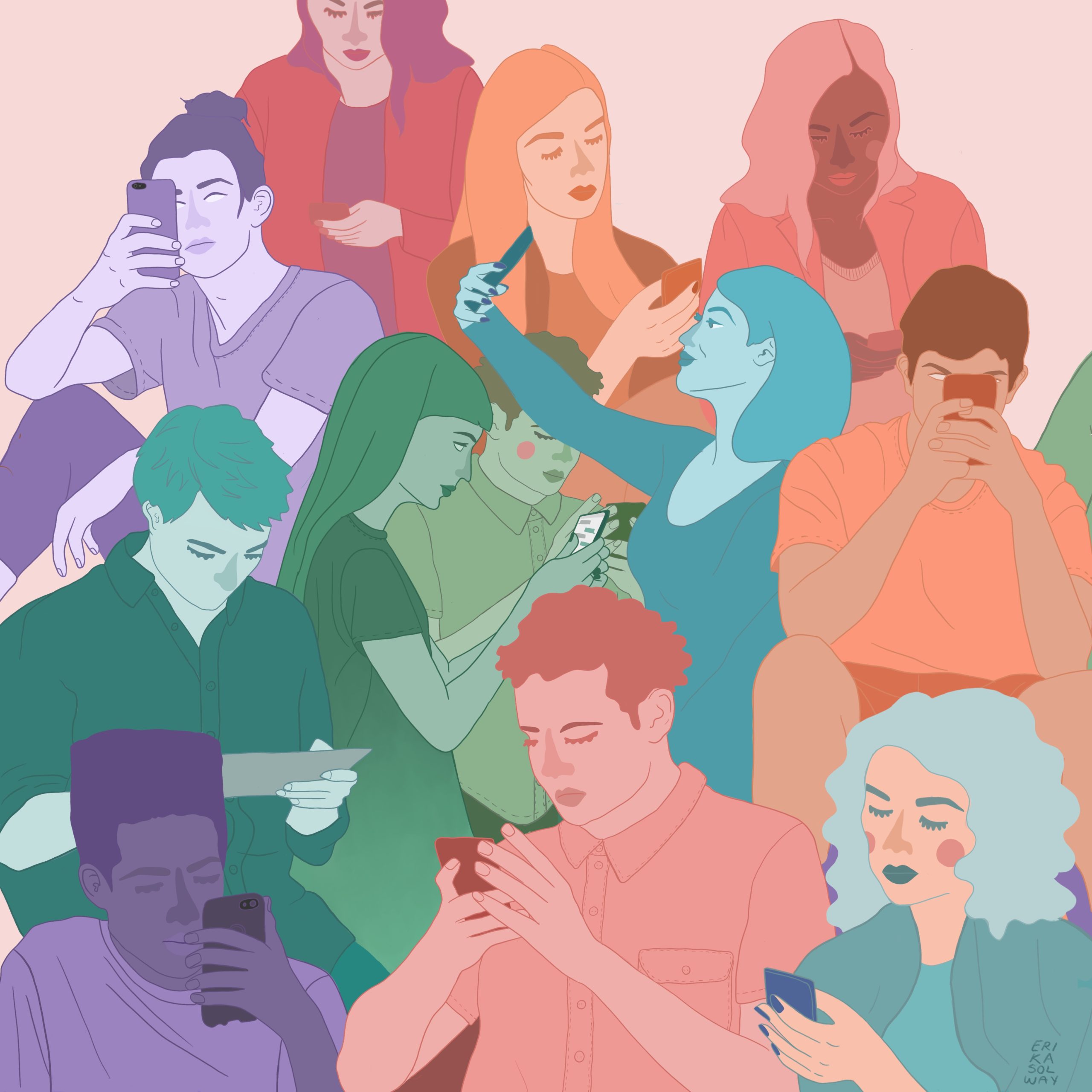What Kind of Digital Friend Are You?
Best friends for-shelter.

Being at home has made me look closely at how I choose and maintain friendships. Without the raft of faces every day on my commute, at restaurants, at work, and with the loneliness resulting from limited communal time under social-distancing practices, phone calls with friends and family have been essential.
As for interacting online, people are starting to realize that everyone has their own unique style. Some are far less ebullient over text, some message you far more than they would ever start a conversation with you in real life, some call you out unnecessarily over photos from the weekend, while others share every aspect of their life. And then there are those friends who seem to message you at just the right time.
Having interaction reduced to distant conversations in worried, loving tones has made me realize just how wonderful being social and sharing time with people is. We are social animals, the adage goes, but when you think about it, everyone makes friends in different ways. Though basic aspects of being social are hard-wired, like empathy through neuron mirroring, the nuanced differences between human cultures and the vast array of upbringings, interests, and educations enabled by contemporary technology surely make the ways we connect different.
How people make friends depends on their disposition and their culture, although technology has always played a role. Imagine all the ways that different societies utilize architecture to shape cultural interaction; how horseback riding, cars, and the telephone allowed us to maintain bonds over long distances; even fire kept conversation flowing, in comforting warmth, into the dark hours of the otherwise lonely night.
With the new shelter-in-place orders that have put socialization on hold, digital friendships need to be expanded into oh-so-human emotional bonds that foster ourselves—our lives, our happiness made possible by dwelling, living, laughing together.
The rise of computer technologies, networks, social media follows the same path of connection that has been growing, steadily, since the first sparks of human community. But that doesn’t mean that we are always sure about the way that we make friends, and now, even those who were skeptical about virtual friendship will have to navigate it, or at least think about its effects.
Recently, I was talking with a good friend who was concerned that they were not making enough friends. They had spent a ton of time networking but not enough time building relationships, yet when I told them how I tend to make friends, they couldn’t see themselves doing the same. The touch-and-go nature of the internet makes the accumulation of friends resemble more of a market than a social group, a phenomenon some have dubbed “an economy of feeling” based on the distributions of likes/loves.
The culture of LinkedIn or Instagram does seem to point toward a commodification of friendship. But with the new shelter-in-place orders that have put socialization on hold, digital friendships need to be expanded into oh-so-human emotional bonds that foster ourselves—our lives, our happiness made possible by dwelling, living, laughing together. How do we live together across screens?
Much of the literature about friend-making is simply “how to make friends” or “best ways to make friends,” without considering that advice that works well for one person may not apply to others.
Interverts?
Many people talk about the distinction between extraverts and introverts. Extraverts typically find pleasure in attention and large groups of friends, while introverts enjoy solitude and solo or small group activities. This distinction was made popular by Carl Jung, who famously broke down psychological “types” into overarching archetypes.
This categorization system is thrown around widely, and is the basis for the Myers-Briggs Type Indicator (MBTI), taken by millions of people every year. Largely considered pseudoscience by the psychological community, the test is used by individuals to feel solidarity in their personality as well as by businesses to find out if potential employees are right for a certain position.
Recently, a slew of writers have come forward claiming that pandemic lockdowns are conditions that many introverts are already well-accustomed to. While this may be bit off the mark—it seems like the stress of global conditions affects everyone, even introverts—it does raise the question of what extremely sociable people are supposed to do when their interaction is limited to the internet. Isolation can have negative psychological effects on any archetype.
I’ve never felt very connected to my personality test results; they’ve always seemed like glorified astrological readings, and I prefer Jung for the charm of his outlandish ideas rather than for any sort of scientific verifiability. Besides, could Jung have predicted the Google Hangouts or gamer chat rooms that make the most introverted individual incredibly sociable through hyperspecific communities based on niche shared interests?
It seems that personality-type tests focus too much on the individual, and just like my friend who confused networking with friend-making, aren’t applicable to the emotional nourishment we all need. Perhaps it is better to consider how we are social rather than how we are as individuals, especially in a time when we realize, in contrast, how being alone really highlights the better parts of ourselves that are brought out by our families.
One could read How to Win Friends and Influence People all they want and still not make inroads into the lasting friendships that they crave. What it takes is understanding your strengths as a friend rather than your shortcomings as an individual. Yet it’s hard to tell how the internet affects these strengths. Does it amplify them? Does it change the way you interact with specific people?
The world of digital dating has bred phenomena like ghosting and the further objectification of individuals. Cyberbullying haunts high schools. Disenfranchised youth come into contact with dangerous ideologies. Even putting aside the more extreme amplifications of bad tendencies on the internet, many I have spoken to have expressed discontent with the lack of touch and eye contact in digital relationships, and it is far easier to be distant or fake through the other side of a screen. Internet friendships also seem to be extensions of real-life one, and the natural need to grow through new bonds may be lacking.
All Figured Out
One group may have some answers in this time where we are forced to rethink how we interact with each other: so-called Internet Natives. I have one foot in this group, but my tendency to like phone calls makes me seem ancient to some who are in their early 20s, less than a decade younger than me.
The younger generations have made a habit out of making friends online, not just keeping up with those made in person. A Pew study showed that more than half of teens have made friends online. Apparently, many of these friendships have the potential to migrate to real life.
Evolving in video games, message boards, and social media, Internet Natives have found ways to not only mirror culture online, but to build communities of their own. Adolescents who may be alienated in an insulated culture or location may find comradery with like-minded individuals who share common interests or experiences. The lack of apparent social cues could also make these spaces more democratic, though hierarchies surely evolve online (anyone who has ever been frustrated with the popularity contest that Twitter has become will be familiar with this aspect).
One thing about the present is that many are now bound by the global event that is the COVID-19 pandemic and, like children who feel alienated from or dissatisfied with shared environmental pressures, are now being forced to fully occupy the decades-burgeoning social space that is the internet.
Getting a Handle on It.
Lydia Denworth, an astute scholar of friendship and author of Friendship: The Evolution, Biology, and Extraordinary Power of Life’s Fundamental Bond, writes that: “For every study that finds a rise in loneliness, there is another showing an increase in connection.” Just like other forms of media and technology, the effect of the internet depends on how you use it.
“The more media we use to maintain a relationship, the stronger that bond is likely to be,” according to Denworth, which is a boon to those who are scared they may lose touch with family, friends, or even coworkers. But what does this mean for making new friends online? First, be aware of how you already act online, just as you are conscious of how you hold yourself at a party, your tone, the quickness of your laugh or smile. It’s also good to be yourself. The boundary between introverts and extraverts will probably break down for a while, but that doesn’t mean that you shouldn’t give people space or check in on them.
The internet breaks down borders, and this can be annoying when you just want a bit of separation from overeager friends or family. But in these times, it could be good to reach out to those that you usually wouldn’t: the person who commented on your Facebook comment, the acquaintance from high school who you never really got to know, a random person with the same rare surname. People would be surprised how much an artist or a writer appreciates a kind note, or how little effort it takes to start some sort of online project of their own.
The world is turning, and a billion windows into the lives of others are open; it’s always more fun to be a friend than a voyeur, and now could be the time that many start learning how, digitally.
________
Never miss a story. Sign up for NUVO’s weekly newsletter here.








